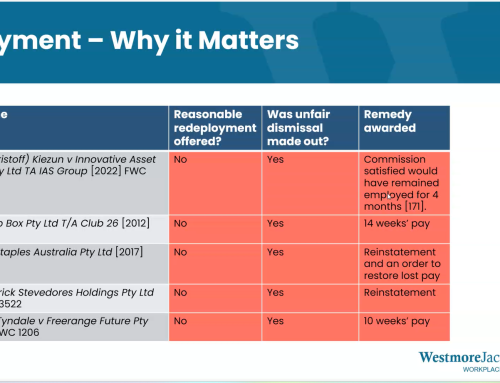
Introduction
The topic of what questions can and can’t be ‘legally’ asked in a job interview is a topic commonly discussed in the media. We felt this was an interesting area to explore in more detail.
This article discusses the federal and Victorian anti-discrimination legislation which cause the most legal risk when asking certain job interview questions. It then explains the main exceptions to these anti-discrimination laws, namely those relating to the ability to perform the inherent (or genuine and reasonable) requirements of the position. Along the way we have included tips for employers concerned about the questions they ask in job interviews.
Be Careful About What You Ask
In Victoria, there is no specific employment legislation which prohibits employers from asking certain questions during job interviews. It is not unlawful for employers to ask questions regarding aspects of an applicant’s personal life, for example their gender or disability.
However, it is unlawful under various anti-discrimination laws for employers to pass over a job applicant for certain reasons (known as ‘protected attributes’). The Fair Work Act 2009 (Cth)’s general protections, Victorian and federal anti-discrimination law prohibit employers from refusing to hire (or hiring on less favorable terms) people because of certain attributes. A PDF table setting out these protected attributes is available by clicking this link. It is here where questions regarding certain aspects of an applicant’s personal life are problematic.Unsuccessful job applicants may allege that a prospective employer who asked them questions regarding certain aspects of their private life chose to not employ them because, or partly because, of their answer.
For example, an unsuccessful applicant asked to disclose to an employer whether they had a disability irrelevant to the job may allege the employer chose to not employ them because of their disability.
For this reason, asking questions relating to protected attributes is fraught with legal risk. They can give unsuccessful applicants an arguable case that they have been discriminated against. They certainly suggest that particular attributes are relevant to an employer’s decision whether to employ a person.
Because
The because requirement in discrimination law is very important. Lawyers sometimes refer to this requirement as ‘causation’. Even if a problematic question is asked in a job interview (and a protected attribute becomes apparent), it still must be shown that the protected attribute was the reason, or a substantially contributing factor, for the applicant not being offered employment.
If the decision to refuse to employ the applicant was made for reasons unrelated to the protected attribute then it is likely there is no discrimination.
An example of this is University of Ballarat v Bridges
The applicant was not offered the job. She alleged that she had been discriminated against by not being offered the job because of her status as a parent. However, the court accepted evidence that she had not been offered the job for other reasons. Namely, her poor performance in the job interview. And because her parental status was not the reason for the refusal to employ, no discrimination had taken place.
It should be noted that where an applicant alleges discrimination in contravention of the Fair Work Act’s general protections, unless the employer can prove otherwise, it will be presumed that they did not employ the applicant for the discriminatory reason they allege.
Inherent Requirements/Genuine and Reasonable Requirements
Employers have a defence to claims under federal anti-age and disability discrimination legislation if the person discriminated against cannot perform the inherent requirements of the position.
Likewise, it is a defence to a claim under the Fair Work Act’s general protections to show that the discrimination was taken because the applicant could not perform the inherent requirements of the position.
Victorian anti-discrimination law has a slightly different exception with respect to disability discrimination. It is a defence to a claim brought under Victorian law if the applicant could not perform the genuine and reasonable requirements of the position even if reasonable adjustments to the position were made, or any adjustments which could be made would be unreasonable.
A classic example of a discriminatory situation which could fall within the above exceptions is that of a job in a nightclub where patrons must be over the age of 18 to enter. An employer would likely be protected by these exceptions if they asked whether an applicant was old enough to legally enter the place of employment and refused to employ the applicant when they found out they are under the age of 18. This is because the applicant cannot perform the inherent requirements of the position.
Federal and Victorian sex discrimination legislation also contain exceptions for employers who limit offering employment to persons of a particular gender, provided it is a genuine occupational requirement of the employment that employees be of a particular gender. An example of where this exemption would apply is where the job involves fitting clothing for persons of a particular gender.
Employers who wish to make use of these exceptions should tailor their job interview questions so that the questions inquire as to an applicant’s ability to perform essential aspects of the job.
An example of such a question could be describing an inherent requirement of the job to an applicant and asking them if they thought they would be able to perform that requirement, and if not, what adjustments, if any, could be made so as to allow them to perform that requirement.
A recent example of the application of the inherent requirements-type exemptions is Kassir v State of Victoria [2012] VCAT 1977.
In Kassir, Mr Kassir applied to become a police officer. In the process of that application he disclosed he had suffered a number of mental illnesses. These included post-traumatic stress disorder, depression and anxiety. Victoria Police rejected Mr Kassir’s application on the basis these made him incapable of performing the genuine and reasonable requirements of a police officer and no reasonable adjustments could change that.
Mr Kassir brought a claim under the Equal Opportunity Act 2010 (Vic). In it, he alleged that Victoria Police did not employ him because of his disabilities. He claimed this constituted disability discrimination.
The Victorian Civil and Administrative Tribunal accepted that resilience to stress, the ability to manage pressure, and perseverance were genuine and reasonable requirements of being a police officer. The Tribunal held Mr Kassir’s condition left him incapable of performing these genuine and reasonable requirements. Mr Kassir’s past inability to cope with educational pressures were influential in the Tribunal’s arriving at this view. Mr Kassir could not suggest any adjustments which could be made to allow him to perform those requirements. As Mr Kassir was not capable of performing the genuine and reasonable requirements of the job, Victoria Police were not liable for disability discrimination.
Kassir shows the importance of the inherent requirements exception. Applicants who are rejected for an inability to perform the inherent requirements of the job, and not for their disability or other protected attributes, will be unlikely to be successful in a discrimination claim.
Consider what the inherent requirements/genuine and reasonable requirements actually are
It is important to determine what the inherent or genuine and reasonable requirements of a position are before you interview applicants. This is so you can craft questions which only ascertain whether an applicant can perform the inherent requirements and, if not, what (if any) adjustments could be made so they could perform those requirements.
Determining the inherent or genuine and reasonable requirements of the position is easier said than done. Just because a particular employment contract stipulates something as an inherent requirement does not make it an inherent requirement.
The courts and tribunals often take a common-sense approach in determining the inherent requirements. The inherent requirements of a position are the essential and defining characteristics of the position. A requirement will be inherent if the position would not be essentially the same without it.
For example, typing may not be an inherent requirement for a position where an employee must prepare documents on a computer. Rather, the inherent requirement is preparing documents on a computer. This can be performed by typing but could also be performed by utilisation of voice-to-text software.
In Butterworth v Independence Australia Services [2015] VCAT 2056, the capacity to spend 7.6 hours on the phone answering customer enquiries was held to not be a genuine and reasonable requirement of a Customer Service Officer (‘CSO’) position. This was because the CSO position helped customers in a number of ways and did not just involve being on the phone all day. The position was much broader than just being on the phone. As there were many other CSOs, there was no need for a requirement that every CSO to be able to stay on the phone 7.6 hours a day.
Conclusion
Whilst Victorian and federal anti-discrimination law do not outlaw asking questions about certain aspects of job applicant’s personal lives, it is often unwise to do so. Questions which pertain to protected attributes may form the basis of a discrimination claim from the applicant, if they can show they were treated unfavourably because of their answer.
Employers should ensure that any questions which may relate to a person’s personal life (eg. their disability) are framed in terms of ability to perform inherent or genuine and reasonable requirements of the job. This is so as to maximise the employer’s chances of making use of the inherent or genuine and reasonable requirements defence.
This article is general information only. It is not legal advice. If you need legal advice, please contact us.






Leave A Comment